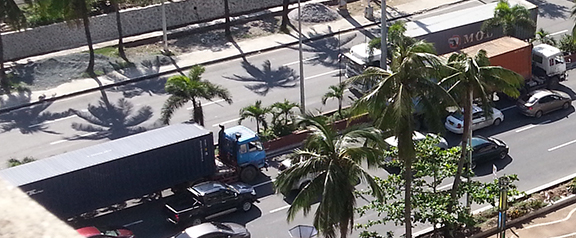-
Government is fast tracking rules to implement Executive Order No. 41, which bans the collection of pass-through fees by local government units
-
Trade assistant secretary Mary Jean Pacheco said DTI is committed to meeting the EO’s 30-day deadline for a draft joint administrative order that would implement EO 41
-
A technical working group will be created to evaluate ordinances of LGUs on pass-through fees
-
A mapping project, initiated before EO 41, will identify nationwide truck routes, aiding truckers and clients in complying with EO 41
The government is fast tracking implementing rules and regulations (IRR) for Executive Order (EO) No. 41, which bans local government units from collecting pass-through fees on national roads and other roads not funded by them.
The Department of Trade and Industry (DTI) is committed to meeting the 30-day deadline for the release of the draft joint administrative order (JAO) that will become EO 41’s IRR, Trade assistant secretary Mary Jean Pacheco told PortCalls at the sidelines of the October 25 public consultation on the draft JAO.
Stakeholders have until October 26 to submit their input on the draft JAO.
Under EO 41, signed by President Ferdinand Marcos, Jr. on September 25 and released on September 28, the DTI, Department of Interior and Local Government (DILG), Department of Transportation (DOTr), Department of Public Works and Highways (DPWH), Department of Finance (DOF), and Anti-Red Tape Authority (ARTA) are tasked with formulating guidelines within 30 days.
The EO said LGUs are not allowed to impose taxes, fees, charges, or other levies on goods transported through their areas, in accordance with Section 133(e) of Republic Act No. 7160, also known as the Local Government Code of 1991.
The draft JAO calls on LGUs, “in the interest of public welfare,” to stop collecting pass-through fees on vehicles carrying goods through local public roads funded by LGUs, excluding privately funded roads.
The JAO will apply to provincial governors, city mayors, municipal mayors, punong barangays, local Sanggunians, local treasurers, concerned government agencies, and all motor vehicles transporting goods or merchandise.
The DILG will instruct LGUs to submit their existing ordinances on pass-through fees, with the possibility of suspending fees upon review. New ordinances must be submitted to the DILG for assessment.
During the public consultation, Atty. Maria Rhodora Flores, chief of the DILG Bureau of Local Government Supervision-Policy Compliance Monitoring Division, said DILG has already issued a memo to LGUs asking them to support the EO and submit their ordinances relating to the transport of goods. Some LGUs have heeded the call, she said.
She acknowledged there is no standard on how and how much pass-through fees are collected. Additionally, Flores admitted DILG does not have the ability to check all ordinances of the more than 1,300 LGUs nationwide.
This is why Flores sought support from stakeholders, asking them to submit to DILG any proof, including stickers and receipts, of LGUs collecting such fees.
The JAO will establish a technical working group (TWG) to review LGU ordinances on pass-through fees but will not have authority to amend or repeal them. The group will be chaired by the DILG secretary or their authorized representative and will comprise representatives from various government agencies and may include private sector representatives.
After its assessment, it may recommend actions, including suspension of fees, notifications of excessive charges, declaring ordinances violative of EO 41, or petitioning for ordinance unconstitutionality.
To enforce EO 41, DTI and DILG will work together and report violations to the Office of the President through the Office of the Executive Secretary.
The DILG should also transmit the TWG recommendations to appropriate authorities that exercise supervision over the LGU officials concerned.
DOTr, meanwhile, will collaborate with truckers’ associations to identify truck routes; DPWH will identify national government-funded roads and bridges.
Truck mapping project
Additionally, a mapping project, initiated before EO 41, involving DTI, three trucking organizations, and the United States Agency for International Development will identify nationwide truck routes, aiding truckers and clients in complying with EO 41.
Failure to adhere to EO 41 and the JAO can result in legal actions and administrative sanctions against public officials, including traffic enforcers.
Truckers have long complained about LGUs charging fees for passing through, mainly in Metro Manila. DILG has consistently deemed these fees illegal since 2006, with the latest ruling being Memorandum Circular (MC) No. 2018-033 in 2018.
In April 2021, ARTA, DILG, and DOF signed Joint Memorandum Circular No. 2021-01, which lays out rules for halting these unlawful charges. This circular reaffirms the principles from MC 2018-033. – Roumina Pablo





